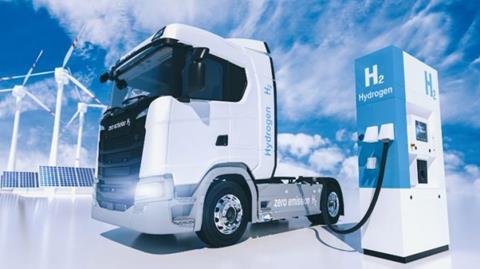
Truck manufacturers are investing in hydrogen fuel-cell technology to develop zero-emissions trucks in order to avoid paying hefty penalties for non-compliance with carbon-emission reduction targets from 2025, according to a report by credit rating firm Fitch Ratings.
The strategy is being driven by the EU’s recent adoption of emission standards and targets for HGVs to help meet carbon-neutrality targets by 2050. These include a 15% average reduction in emissions from 2025 and a 30% reduction from 2030, compared to current rates.
Heavy-duty vehicles, including trucks and buses, are responsible for around a fifth of carbon dioxide (CO2) emissions from road transport in the EU and around 6% of total EU carbon emissions.
Truck manufacturers who fail to meet these targets could face hefty penalties for non-compliance.
The report states: “Fitch-rated truck manufacturers in Europe are banking on hydrogen fuel-cell technology for heavy-duty truck electrification. The high cost of manufacturing and operating fuel-cell trucks is one of the main obstacles. Costs will have to reduce significantly before production could be ramped up.
It adds: “If development of fuel-cell trucks continues as planned, mass production could become achievable in the next decade, while more than 40% of heavy-duty trucks could be produced using this technology in 2050.”
The report says this will require significant investment by truck manufacturers.
“Some manufacturers, like TRATON, could shift their investments from internal combustion technologies to electrification without significantly increasing capex. Other, such as CNH Industrial may need to increase their investment budgets,” the report concludes.
In December last year a new common-interest alliance called H2Accelerate (H2A) was launched with the aim of helping hydrogen trucks achieve a breakthrough across Europe.
The initiative is backed by Daimler Truck, Iveco, OMV, Shell and the Volvo Group. The partners estimate that nationwide introduction will take about a decade.
The move closely followed Volvo and Daimler Truck signing a binding agreement for a joint venture to develop, produce and commercialise fuel cell systems for use in heavy-duty trucks.













